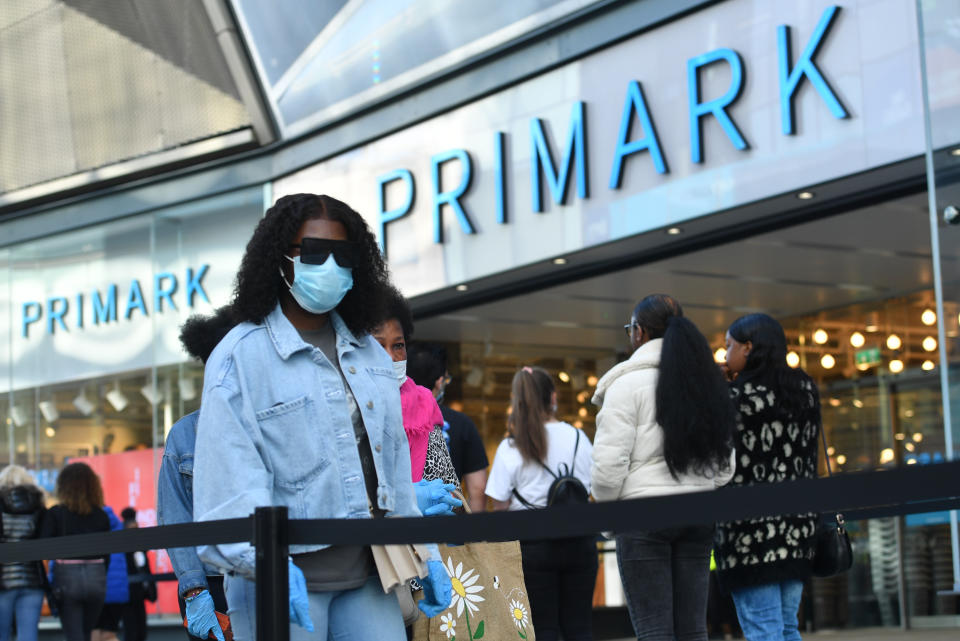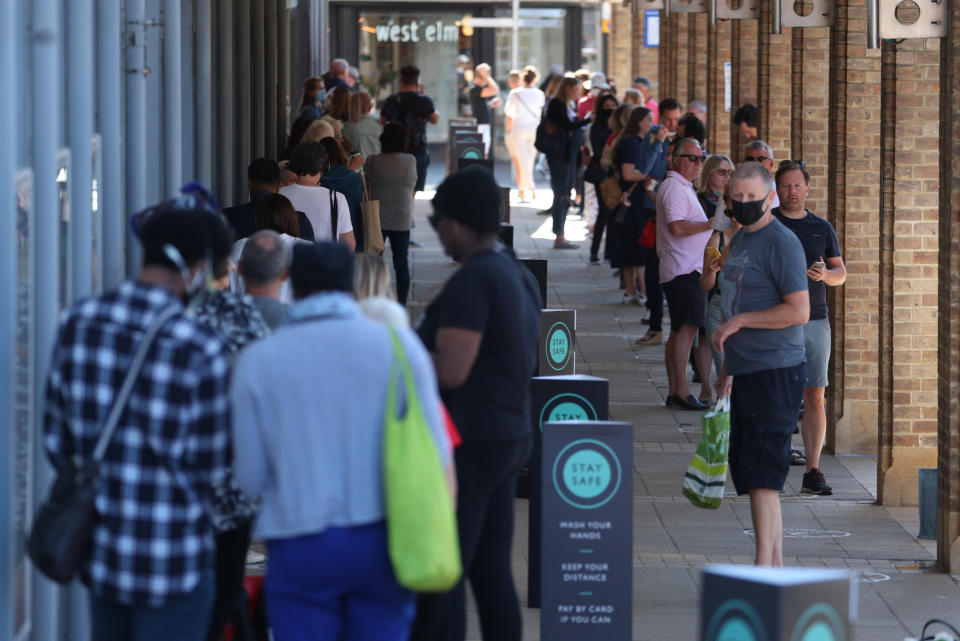What to watch: Queues form as shops reopen, sharp sell-off for stocks, and BP writes off $17.5bn

Here are the top business, market, and economic stories you should be watching today in the UK, Europe, and abroad:
Queues form as shops reopen
Photographers captured queues forming at shopping centres and on High Streets across the country on Monday, as non-essential retailers opened their doors for the first time in months.
Queues were captured in front of Primark in Birmingham and John Lewis in Kingston-upon-Thames, while lines were also reported outside Primark’s London branch.

It came as restrictions on non-essential retailers officially began to ease on Monday. The government now permits non-food shops to open so long as they have new health and safety measures in place.
The prime minister has said people “should shop, and shop with confidence”, so long as social distancing measures are respected.
Second wave fears spark sharp sell-off for global stocks
Stocks around the world sold off on Monday, as fears about a resurgence in COVID-19 infections around the world dampened risk appetite.
The FTSE 100 (^FTSE) opened down 2.1% in London, while the DAX (^GDAXI) fell 2.8% in Frankfurt, and the CAC 40 (^FCHI) shed 2.4% in Paris.
US futures pointed to a sharp sell-off when stock markets open in New York later today. S&P 500 futures (ES=F) were down 2.8%, Dow Jones futures (YM=F) were 3.2% lower, and Nasdaq futures (NQ=F) were down 2.1%.
Asian markets closed broadly lower overnight. Japan’s Nikkei (^N225) lost 3.4% and the Hong Kong Hang Seng (^HSI) fell 2.1%. On mainland China, the Shanghai Composite (000001.SS) dropped 1% and the Shenzen Component (399001.SZ) fell 0.5%.
“Reporting its highest number of new cases in two months, Beijing officials have imposed regional lockdown measures in certain areas, with spokesman Xu Heijian warning that the risk of a sharper outbreak is ‘very high’,” said Connor Campbell, a financial analyst at SpreadEx.
“China’s not alone. Having never actually got a handle on the pandemic, the US has seen a surge in new cases in multiple states.
“After the situation in Texas rapidly deteriorated last week, Alabama, Florida and South Carolina have all followed suit with three consecutive days of record numbers. This as Trump plans to further open up the US economy.”
BP writes off $17.5bn as it cuts oil price outlook
BP (BP.L) has sharply downgraded its oil price expectations for the coming decades, predicting the coronavirus crisis will accelerate a shift towards greener energy.
Its figures now suggest benchmark brent crude prices will average at $55 a barrel between next year and 2050, with gas prices also revised downwards.
A spokesperson said it marked a drop of around 30% on previous forecasts, according to Reuters.
The downgrade means BP’s assets are now worth far less than the company initially predicted. The oil and gas giant said on Monday it will take a write-down of up to $17.5bn (£13.9bn) in is earnings for the second quarter. Its share price slid 5.5% in early trading in London.
Metro Bank in 'early talks' to buy peer-to-peer lender RateSetter
Troubled challenger bank Metro (MTRO.L) has confirmed it is in early talks to acquire peer-to-peer lender RateSetter.
Metro Bank said in a statement on Monday it had entered into exclusive deal talks with RateSetter, but said discussions were “at an early stage”. The statement followed a report from Sky News on Sunday evening revealing the deal talks.
Metro Bank said a takeover could “accelerate the company's stated strategy to grow its unsecured consumer lending book.”
“There can be no certainty at this stage that a formal agreement will be reached, nor as to the terms of any agreement,” the bank said. “A further announcement will be made if and when appropriate.”
Shares rose almost 3% in response.
House prices jump in England as estate agents overwhelmed
Asking prices for properties in England are more than £6,000 higher than before the lockdown began, according to Rightmove.
Homeowners appear to be confident of cashing in on a “flood of pent-up demand” and new interest in moving sparked by the lockdown, despite the economic fallout of the pandemic.
Rightmove figures published on Monday suggest the number of people contacting estate agents for valuation requests has burst through daily records.
MPs warn more than a million workers 'locked out' of job schemes
A cross-party group of MPs published a report on Monday urging the government to “help those who have fallen through the gaps.” The Treasury select committee warns many workers face hardship while others receive six months of grants far more generous than Britain’s benefit system.
The “forgotten” include many workers in new jobs, the newly or partially self-employed, company directors paid mainly via dividends, and anyone earning over £50,000 in recent years regardless of current income.
UK manufacturers urge national recovery plan as output plummets
Britain’s manufacturers are calling for a national recovery plan, including an immediate stimulus package, to boost investment and save jobs.
It comes on the back of a survey by Make UK, a representative for manufacturers, and accountancy and business advisory firm BDO, which shows that second quarter output in the manufacturing sector plunged to a record low amid the economic fallout from the coronavirus pandemic.
Make UK said the government should launch a stimulus package, beginning with a business rates holiday for manufacturers, similar to that granted to the retail sector earlier this year.
Think tank calls for creation of pension 'superfunds' for green projects
The UK needs pension “superfunds” to invest in green projects to help the country recover from the economic fallout of the coronavirus, think-tank The Social Market Foundation (SMF) said.
Ministers should encourage pension funds to merge into fewer, larger funds able to invest large sums in big long-term projects, the organisation said. These funds could be used to build roads, power sources and communications networks, whilst creating more jobs.
The report also said ministers should be ready to take risks and spend public money to support innovative infrastructure projects and new renewable energy markets in their early stages.

 Yahoo Finance
Yahoo Finance 